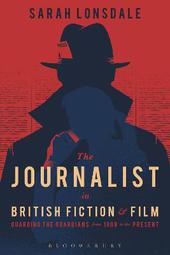
|
The Journalist in British Fiction and Film: Guarding the Guardians from 1900 to the Present
Paperback / softback
Main Details
| Title |
The Journalist in British Fiction and Film: Guarding the Guardians from 1900 to the Present
|
| Authors and Contributors |
By (author) Sarah Lonsdale
|
| Physical Properties |
| Format:Paperback / softback | | Pages:296 | | Dimensions(mm): Height 234,Width 156 |
|
| Category/Genre | Films and cinema
Literary studies - from c 1900 - |
|---|
| ISBN/Barcode |
9781474220545
|
| Classifications | Dewey:820.939 |
|---|
| Audience | | Undergraduate | | Postgraduate, Research & Scholarly | |
|---|
|
Publishing Details |
| Publisher |
Bloomsbury Publishing PLC
|
| Imprint |
Bloomsbury Academic
|
| Publication Date |
14 July 2016 |
| Publication Country |
United Kingdom
|
Description
Why did Edwardian novelists portray journalists as swashbuckling, truth-seeking super-heroes whereas post-WW2 depictions present the journalist as alienated outsider? Why are contemporary fictional journalists often deranged, murderous or intensely vulnerable? As newspaper journalism faces the double crisis of a lack of trust post-Leveson, and a lack of influence in the fragmented internet age, how do cultural producers view journalists and their role in society today? In The Journalist in British Fiction and Film Sarah Lonsdale traces the ways in which journalists and newspapers have been depicted in fiction, theatre and film from the dawn of the mass popular press to the present day. The book asks first how journalists were represented in various distinct periods of the 20th century and then attempts to explain why these representations vary so widely. This is a history of the British press, told not by historians and sociologists, but by writers and directors as well as journalists themselves. In uncovering dozens of forgotten fictions, Sarah Lonsdale explores the bare-knuckled literary combat conducted by writers contesting the disputed boundaries between literature and journalism. Within these texts and films there is perhaps also a clue as to how the best aspects of 'Fourth estate' journalism can survive in the digital age. Authors covered in the volume include: Martin Amis, Graham Greene, George Orwell, Pat Barker, Evelyn Waugh, Elizabeth Bowen, Arnold Wesker and Rudyard Kipling. Television and films covered include House of Cards (US and UK versions), Spotlight, Defence of the Realm, Secret State and State of Play.
Author Biography
Sarah Lonsdale is a Lecturer in Journalism at City University London, UK. She is also a journalist with twenty five years experience and contributes to the Sunday Times and Telegraph.
ReviewsA riveting read for would-be writers ... It's a fascinating bit of academic research ... as well as a great tour through over a century of bookshelves and movie-studio cutting rooms. * The Observer * Lonsdale's analysis reaches further back in history than most studies of the media ... A first rate-book that amply demonstrates why ... journalists who speak truth to power are needed more than ever. * Times Literary Supplement * [A] thorough and entertaining book. * Prospect * Sarah Lonsdale's book is a welcome addition to this body of research ... journalism seems likely to remain a source of popular culture fascination on both sides of the Atlantic, making historically informed studies like this book particularly important. * Journalism * From heroes to media scum, this book provides an assessment of how journalists have been represented in fictional form. It also makes a major contribution to considerations of the much-derided 'middle-brow'. It grafts this longitudinal analysis onto a rich and engaging history of journalism itself. Reclaiming the role of the journalist for the contemporary age - journalists and the public, take note - you need each other! * Martin Conboy, Professor of Journalism History, University of Sheffield, UK * This book essential reading for anyone who wants to know how we've come to feel about journalists and journalism the way we do. Sarah Lonsdale's great and original achievement is to use fiction, film and theatre to trace the Fourth Estate's reputational ups and downs over the last 100 years. This is a work of immaculate scholarship deeply informed by Lonsdale's long and eminent career as a newspaper journalist. * Kathryn Hughes, Professor of Life Writing, University of East Anglia, UK * Lonsdale doesn't just chart the fictional journalist's cycle from villain to hero and back again but shows clearly how much and simultaneously, how little has changed over the past 100 years. The one thing that never alters is how journalists persistently live down to others' expectations and take pleasure in their ambiguous reputation. It's a strange trade and Lonsdale's fascinating guide to how others see us should be both a warning and something for us all to aim for. If as a journalist you don't want to anger or irritate people you're in the wrong job. * Susie Boniface, journalist, aka 'Fleet Street Fox' *
|